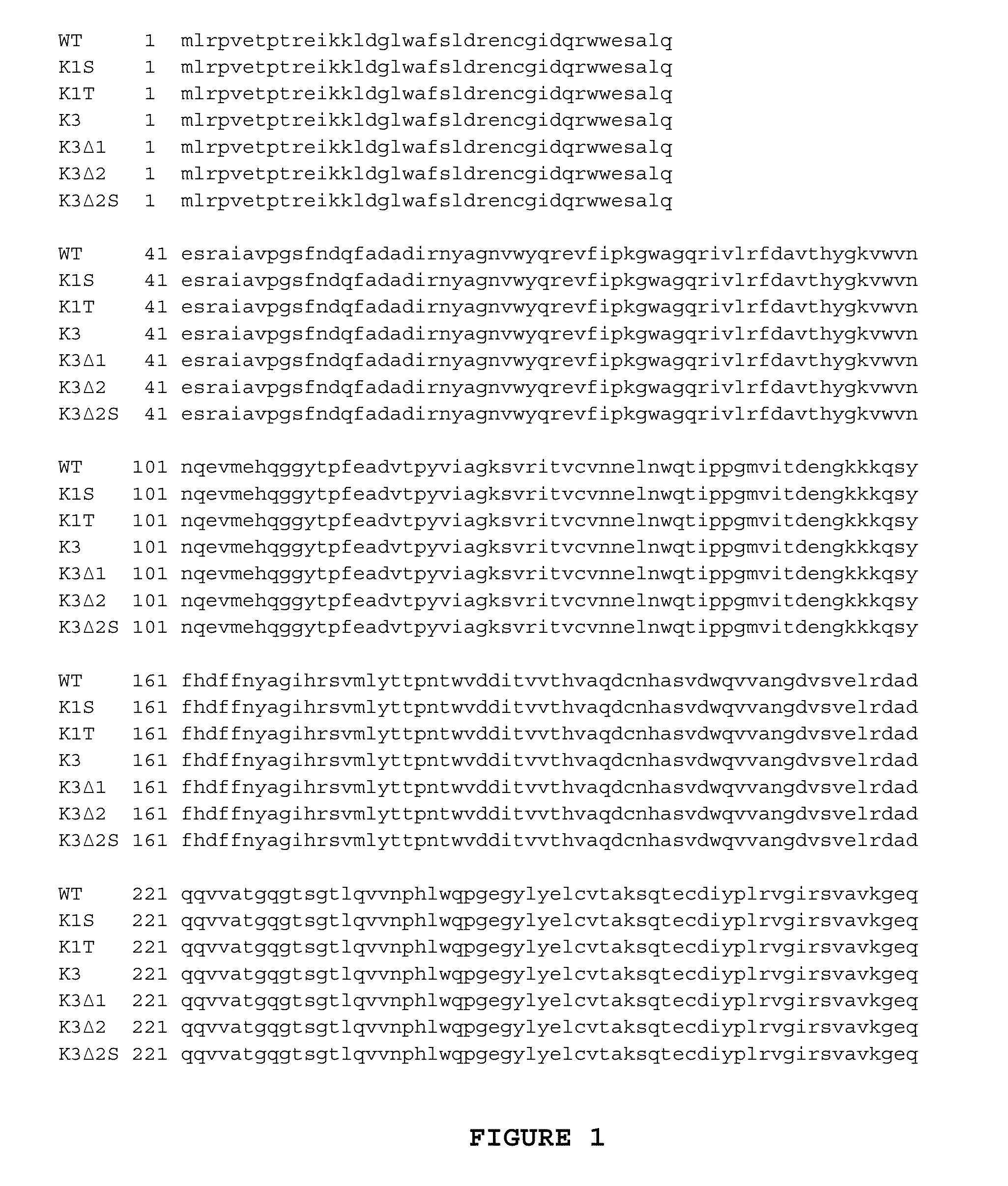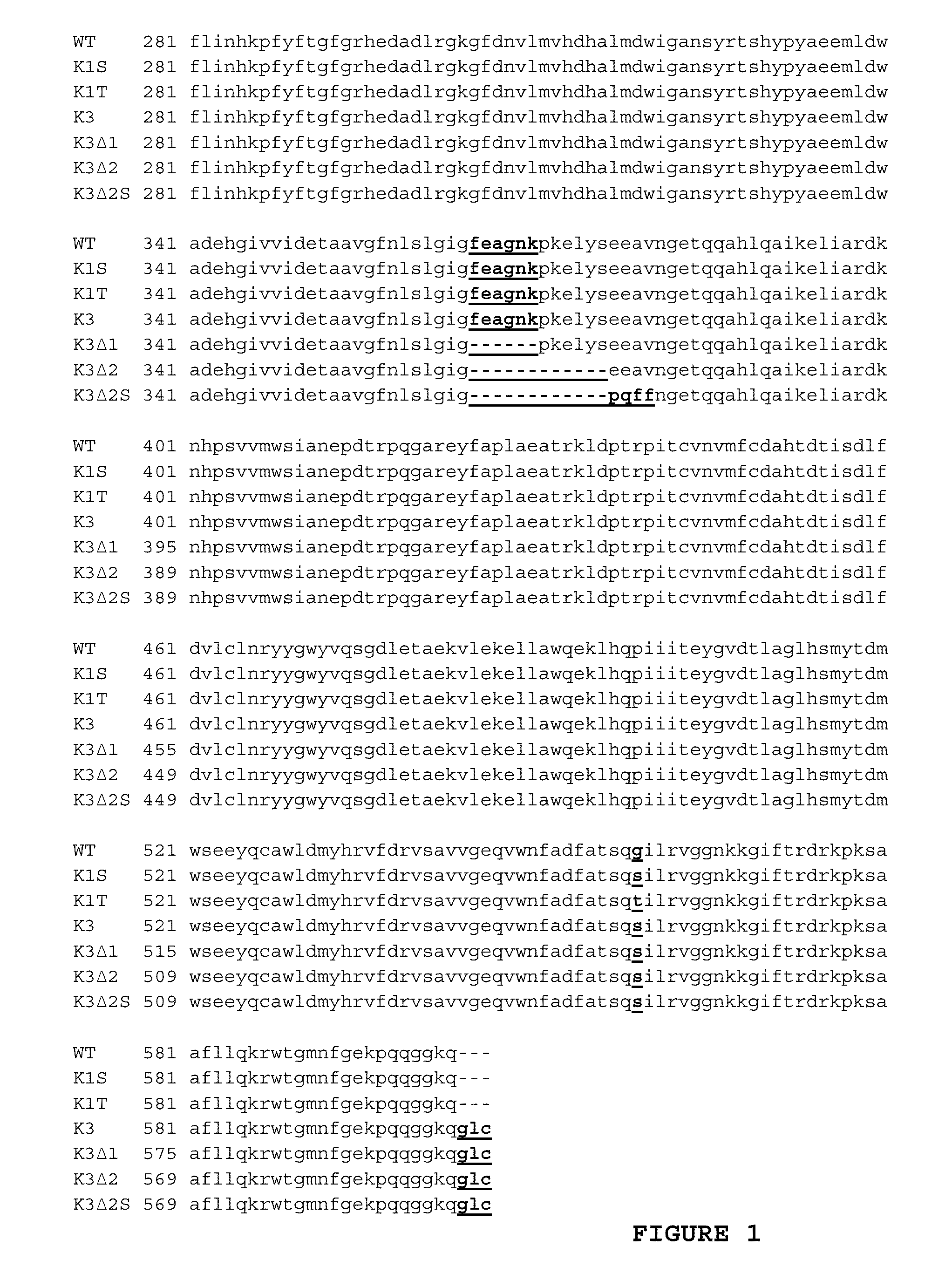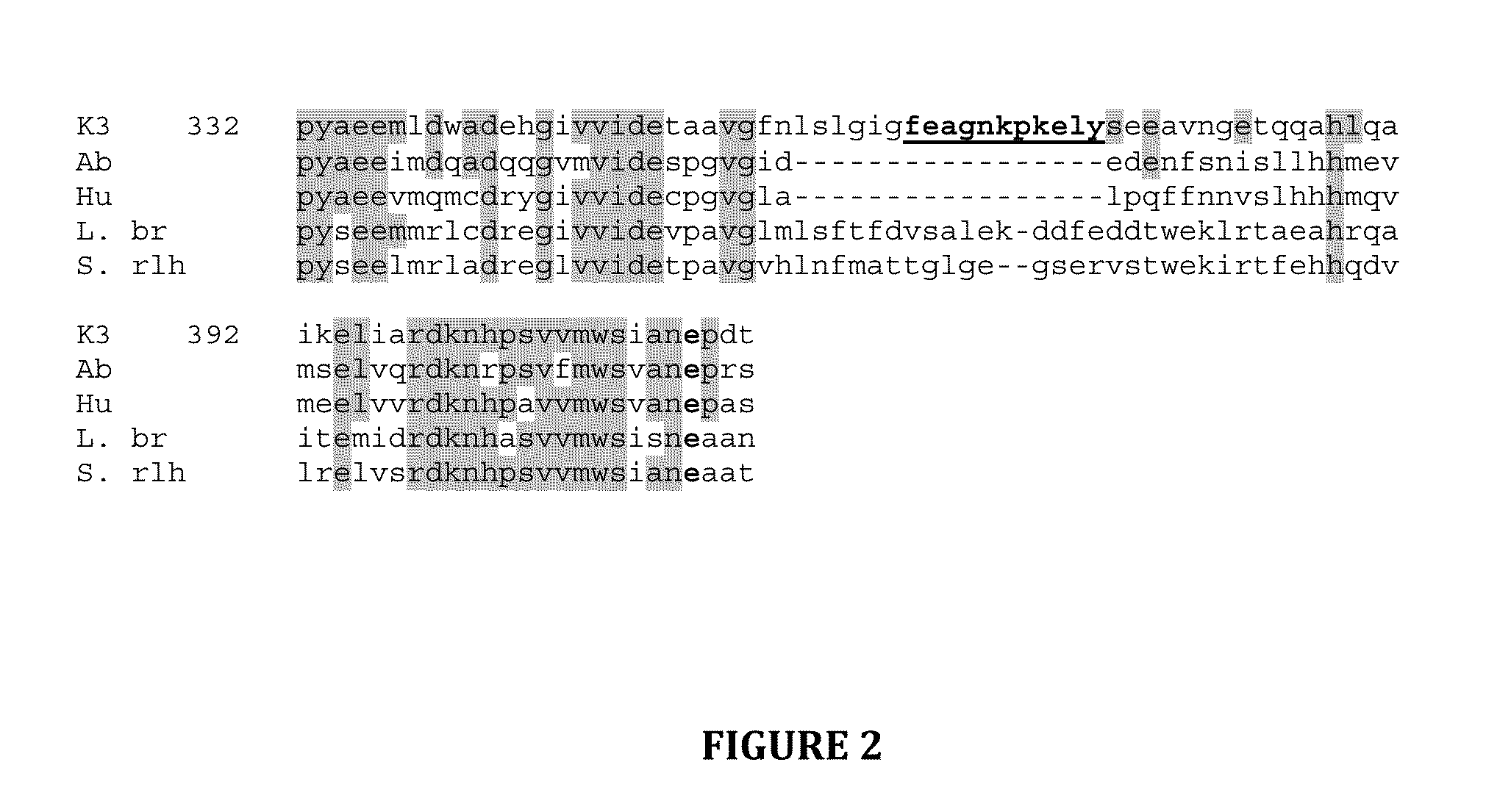Mutant beta-glucuronidase enzymes with enhanced enzymatic activity
a technology of enzymatic activity and beta-glucuronidase, which is applied in the field of enhanced enzymatic activity of mutant beta-glucuronidase enzymes, can solve the problems of interfering with enzyme activity and their level of enzyme activity, and achieves enhanced enzymatic activity, shorter time frame, and higher thermal stability
- Summary
- Abstract
- Description
- Claims
- Application Information
AI Technical Summary
Benefits of technology
Problems solved by technology
Method used
Image
Examples
example 1
Cloning of E. coli β-Glucuronidase (BGUS) Gene
[0097]In this example, the wild type E. coli BGUS sequence was cloned by polymerase chain reaction (PCR) based on the published E. coli K12 BGUS sequence derived from the E. coli genome (NCBI Reference Sequence NC_000913.2), shown in SEQ ID NO: 1. The forward primer used for PCR had the following sequence: GAGAGACATATGTTACGTCCTGTAGAAACCCC (SEQ ID NO: 2). The reverse primer for PCR had the following sequence: GAGAGAAAGCTTTCATTGTTTGCCTCCCTGCT (SEQ ID NO: 3). The forward primer contains an NdeI restriction site and the reverse primer contains a HindIII restriction site.
[0098]To isolate a sample of E. coli DH5a strain genomic DNA, 5 ml of LB culture were grown overnight and 1 ml of cells was pelleted in a 1.5 ml tube. The cells were resuspended in 50 μl of water and were heated at 95° C. for 5 minutes to lyse the cells. The debris was pelleted and 10 μl of supernatant was used as a template in the PCR reaction.
[0099]For the PCR reaction, the...
example 2
Mutagenesis of E. coli β-Glucuronidase (BGUS) Gene
[0104]Overlap extension PCR was used to create mutations in the E. coli K12 BGUS ORF using the plasmid encoding the wild type enzyme as the template. Four primers were used to create the K1S mutant (having a G559S single amino acid substitution), as follows:
(SEQ ID NO: 4)BGUS Forward:CTGCTGTCGGCTTTAACCTC(SEQ ID NO: 5)G559S Forward:GACCTCGCAAAGCATATTGCG(SEQ ID NO: 6)G559S Reverse:CGCAATATGCTTTGCGAGGTC(SEQ ID NO: 7)Vector Reverse:CTAGTTATTGCTCAGCGGT
[0105]Two parallel PCR reactions were set up that were designed to produce the 5′ and 3′ parts of the desired mutated DNA fragments. Reaction 1 contained the following: 10× Pfu Buffer (5 μl), 10 mM dNTP (1 μl), 10 μM BGUS forward primer (1 μl), 10 μM G559 reverse primer (1 μl), wild-type plasmid template (0.1 μg / μl) (1 μl), Pfu enzyme (1 μl), water (40 μl). Reaction 2 contained the following: 10× Pfu Buffer (5 μl), 10 mM dNTP (1 μl), 10 μM G559S forward primer (1 μl), 10 μM Vector reverse pr...
example 3
β-Glucuronidase Enzymatic Activity Assay
[0117]In this example, a standard enzyme activity assay for BGUS is described. The standard reporting format for this assay is in Units / ml for liquid formulations or in Units / mg for lyophilized formulations.
[0118]An activity assay buffer, 20 mM potassium phosphate buffer, pH 6.8, was prepared. The substrate solution used was 1 mM phenolphthaleine-glucuronide (PT-gluc) in water, prepared fresh. 400 μl of activity buffer was pipetted into a clean 1.5 ml microfuge tube. 4 μl of enzyme solution was added to the buffer to achieve a 1:100 dilution of the enzyme. Then, 30 μl of the diluted enzyme solution was pipetted in each well of a 96-well plate, with each enzyme solution performed in triplicate. 30 μl of diluted control enzyme solution was pipetted into control wells in triplicate. 30 μl of the PT-gluc substrate solution was pipetted into the wells with the enzyme solution. The plates were incubated for 30 minutes at 25° C. 180 μl of glycine was...
PUM
| Property | Measurement | Unit |
|---|---|---|
| Temperature | aaaaa | aaaaa |
| Time | aaaaa | aaaaa |
| Cell angle | aaaaa | aaaaa |
Abstract
Description
Claims
Application Information
 Login to View More
Login to View More - R&D
- Intellectual Property
- Life Sciences
- Materials
- Tech Scout
- Unparalleled Data Quality
- Higher Quality Content
- 60% Fewer Hallucinations
Browse by: Latest US Patents, China's latest patents, Technical Efficacy Thesaurus, Application Domain, Technology Topic, Popular Technical Reports.
© 2025 PatSnap. All rights reserved.Legal|Privacy policy|Modern Slavery Act Transparency Statement|Sitemap|About US| Contact US: help@patsnap.com



